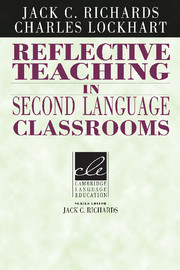Book contents
- Frontmatter
- Contents
- Series editor's preface
- Preface
- Introduction: Teacher development through exploring classroom processes
- 1 Approaches to classroom investigation in teaching
- 2 Exploring teachers' beliefs
- 3 Focus on the learner
- 4 Teacher decision making
- 5 The role of the teacher
- 6 The structure of a language lesson
- 7 Interaction in the second language classroom
- 8 The nature of language learning activities
- 9 Language use in the classroom
- Epilogue
- References
- Index
Epilogue
Published online by Cambridge University Press: 29 January 2010
- Frontmatter
- Contents
- Series editor's preface
- Preface
- Introduction: Teacher development through exploring classroom processes
- 1 Approaches to classroom investigation in teaching
- 2 Exploring teachers' beliefs
- 3 Focus on the learner
- 4 Teacher decision making
- 5 The role of the teacher
- 6 The structure of a language lesson
- 7 Interaction in the second language classroom
- 8 The nature of language learning activities
- 9 Language use in the classroom
- Epilogue
- References
- Index
Summary
This book reflects a different perspective on teacher development from that implicit in many TESL education programs. Traditional views of language teaching have often seen it as an applied science, that is, as “Applied linguistics.” The significant theory and knowledge base underlying teaching is presented during the campus course. The teacher's job is to apply this knowledge in the classroom. Once teachers enter teaching they are expected to master the more “trivial” aspects of teaching, such as how to handle routine classroom techniques and procedures. Improvement in teaching comes about as teachers match their teaching more closely to the theories and principles introduced during their MATESL (or similar) course.
The concept of reflective teaching, however, as with other inquiryoriented approaches to teaching, makes different assumptions about the nature of teacher development. The process of reflecting upon one's own teaching is viewed as an essential component in developing knowledge and theories of teaching, and is hence a key element in one's professional development. This process is one which continues throughout a teacher's career. Formal programs of teacher education represent only an initial, though essential, first phase in teacher development. As Zeichner (1992: 297) observes:
… learning to teach is a process that continues throughout a teacher's career and no matter what we do in our teacher education programs and no matter how well we do it, at best we can only prepare teachers to begin teaching. Consequently, teacher educators must be committed to helping prospective teachers internalize the dispositions and skills to study their teaching and to become better at teaching over time, that is, to help teachers take responsibility for their own professional development.
- Type
- Chapter
- Information
- Reflective Teaching in Second Language Classrooms , pp. 202 - 204Publisher: Cambridge University PressPrint publication year: 1994

